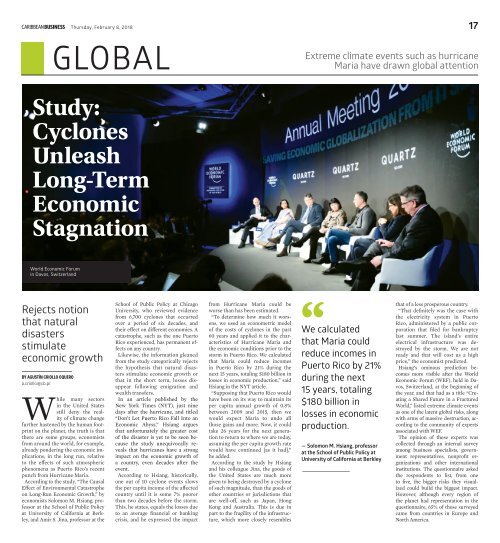You also want an ePaper? Increase the reach of your titles
YUMPU automatically turns print PDFs into web optimized ePapers that Google loves.
Thursday, February 8, <strong>2018</strong> 17<br />
GLOBAL<br />
Extreme climate events such as hurricane<br />
Maria have drawn global attention<br />
Study:<br />
Cyclones<br />
Unleash<br />
Long-Term<br />
Economic<br />
Stagnation<br />
World Economic Forum<br />
in Davos, Switzerland<br />
Rejects notion<br />
that natural<br />
disasters<br />
stimulate<br />
economic growth<br />
BY AGUSTÍN CRIOLLO OQUERO<br />
a.criollo@cb.pr<br />
While many sectors<br />
in the United States<br />
still deny the reality<br />
of climate change<br />
further hastened by the human footprint<br />
on the planet, the truth is that<br />
there are some groups, economists<br />
from around the world, for example,<br />
already pondering the economic implications,<br />
in the long run, relative<br />
to the effects of such atmospheric<br />
phenomena as Puerto Rico’s recent<br />
punch from Hurricane Maria.<br />
According to the study, “The Causal<br />
Effect of Environmental Catastrophe<br />
on Long-Run Economic Growth,” by<br />
economists Solomon M. Hsiang, professor<br />
at the School of Public Policy<br />
at University of California at Berkley,<br />
and Amir S. Jina, professor at the<br />
School of Public Policy at Chicago<br />
University, who reviewed evidence<br />
from 6,700 cyclones that occurred<br />
over a period of six decades, and<br />
their effect on different economies. A<br />
catastrophe, such as the one Puerto<br />
Rico experienced, has permanent effects<br />
on any country.<br />
Likewise, the information gleaned<br />
from the study categorically rejects<br />
the hypothesis that natural disasters<br />
stimulate economic growth or<br />
that in the short term, losses disappear<br />
following emigration and<br />
wealth transfers.<br />
In an article published by the<br />
New York Times (NYT), just nine<br />
days after the hurricane, and titled<br />
“Don’t Let Puerto Rico Fall Into an<br />
Economic Abyss,” Hsiang argues<br />
that unfortunately the greater cost<br />
of the disaster is yet to be seen because<br />
the study unequivocally reveals<br />
that hurricanes have a strong<br />
impact on the economic growth of<br />
a country, even decades after the<br />
event.<br />
According to Hsiang, historically,<br />
one out of 10 cyclone events slows<br />
the per capita income of the affected<br />
country until it is some 7% poorer<br />
than two decades before the storm.<br />
This, he states, equals the losses due<br />
to an average financial or banking<br />
crisis, and he expressed the impact<br />
from Hurricane Maria could be<br />
worse than has been estimated.<br />
“To determine how much it worsens,<br />
we used an econometric model<br />
of the costs of cyclones in the past<br />
60 years and applied it to the characteristics<br />
of Hurricane Maria and<br />
the economic conditions prior to the<br />
storm in Puerto Rico. We calculated<br />
that Maria could reduce incomes<br />
in Puerto Rico by 21% during the<br />
next 15 years, totaling $180 billion in<br />
losses in economic production,” said<br />
Hsiang in the NYT article.<br />
“Supposing that Puerto Rico would<br />
have been on its way to maintain its<br />
per capita annual growth of 0.8%<br />
between 2009 and 2015, then we<br />
would expect Maria to undo all<br />
those gains and more. Now, it could<br />
take 26 years for the next generation<br />
to return to where we are today,<br />
assuming the per capita growth rate<br />
would have continued [as it had],”<br />
he added.<br />
According to the study by Hsiang<br />
and his colleague Jina, the goods of<br />
the United States are much more<br />
given to being destroyed by a cyclone<br />
of such magnitude, than the goods of<br />
other countries or jurisdictions that<br />
are well-off, such as Japan, Hong<br />
Kong and Australia. This is due in<br />
part to the fragility of the infrastructure,<br />
which more closely resembles<br />
We calculated<br />
that Maria could<br />
reduce incomes in<br />
Puerto Rico by 21%<br />
during the next<br />
15 years, totaling<br />
$180 billion in<br />
losses in economic<br />
production.<br />
— Solomon M. Hsiang, professor<br />
at the School of Public Policy at<br />
University of California at Berkley<br />
that of a less prosperous country.<br />
“That definitely was the case with<br />
the electricity system in Puerto<br />
Rico, administered by a public corporation<br />
that filed for bankruptcy<br />
last summer. The island’s entire<br />
electrical infrastructure was destroyed<br />
by the storm. We are not<br />
ready and that will cost us a high<br />
price,” the economist predicted.<br />
Hsiang’s ominous prediction becomes<br />
more visible after the World<br />
Economic Forum (WEF), held in Davos,<br />
Switzerland, at the beginning of<br />
the year, and that had as a title “Creating<br />
a Shared Future in a Fractured<br />
World,” listed extreme climate events<br />
as one of the latent global risks, along<br />
with arms of massive destruction, according<br />
to the community of experts<br />
associated with WEF.<br />
The opinion of these experts was<br />
collected through an internal survey<br />
among business specialists, government<br />
representatives, nonprofit organizations<br />
and other international<br />
institutions. The questionnaire asked<br />
the respondents to list, from one<br />
to five, the bigger risks they visualized<br />
could build the biggest impact.<br />
However, although every region of<br />
the planet had representation in the<br />
questionnaire, 65% of those surveyed<br />
came from countries in Europe and<br />
North America.


